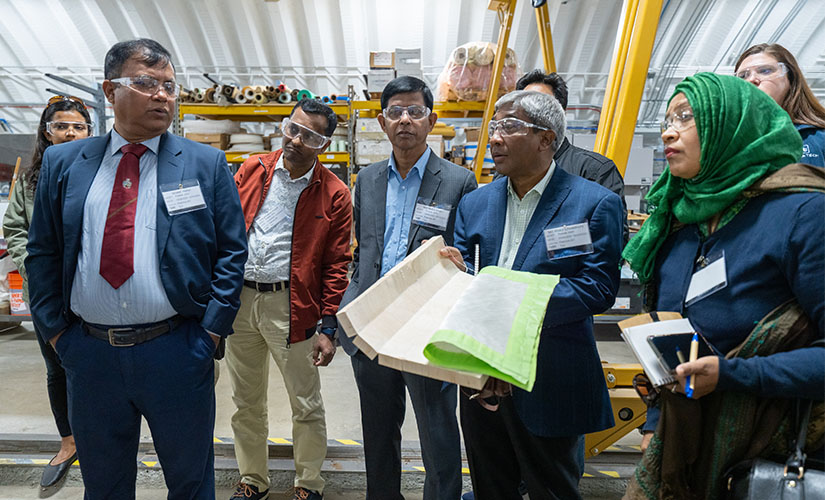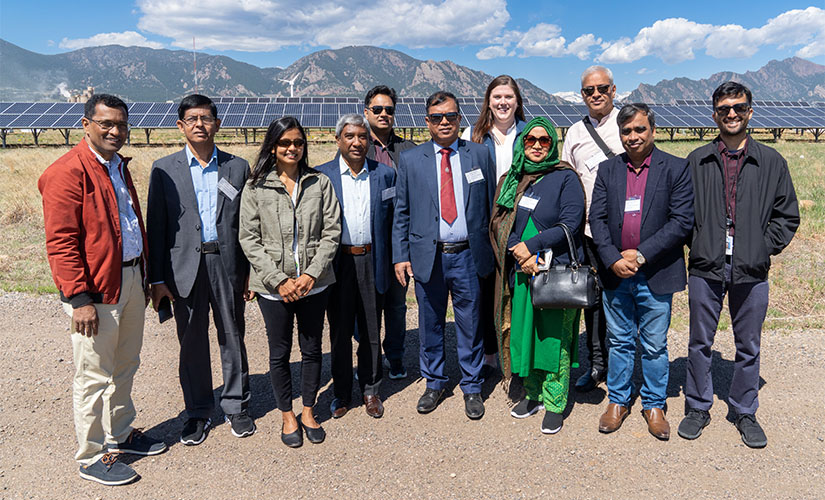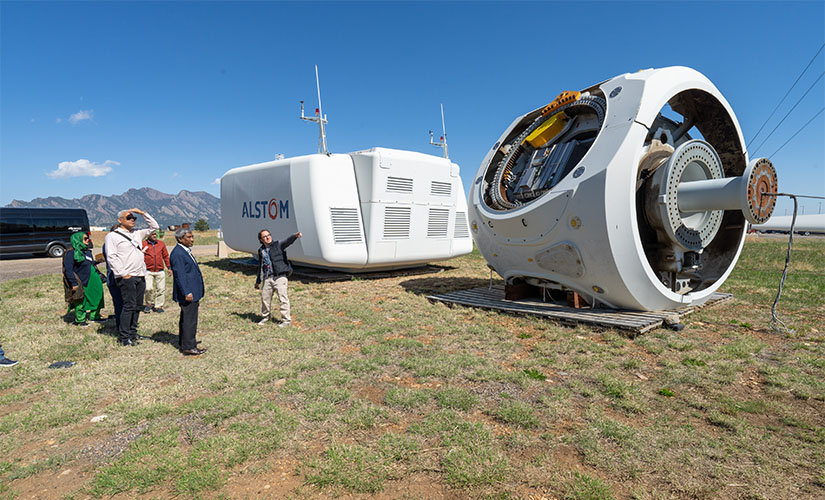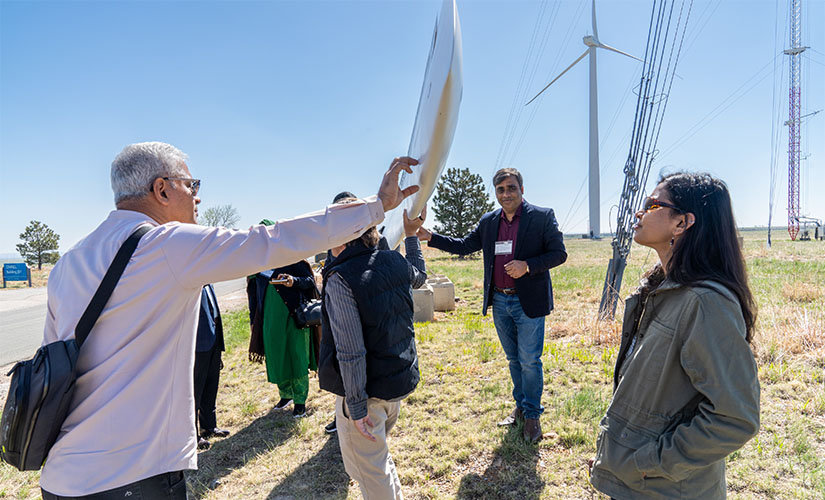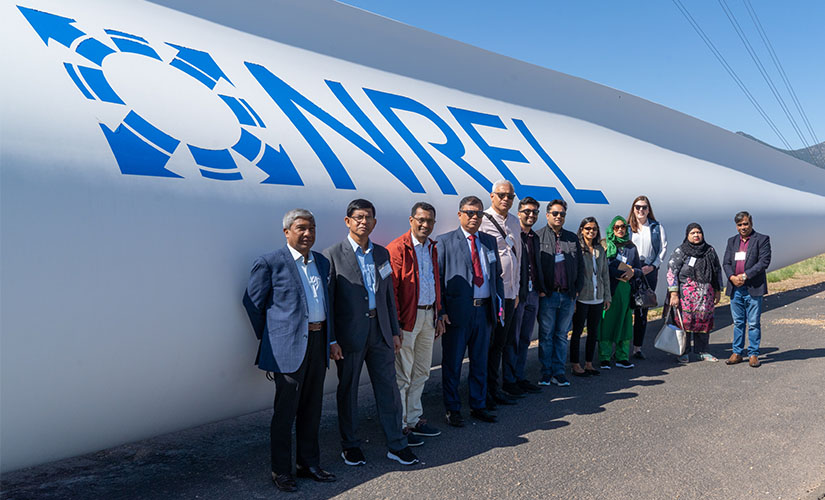Delegation From Bangladesh, NREL's Longest-Running USAID Country Partner, Touches Down in Colorado
Bangladeshi Visitors Experienced NREL’s World-Class Facilities and Explored Opportunities To Accelerate Achieving Their Clean Energy Goals
They say April showers bring May flowers, but what do May showers bring? In this case, rainy days greeted a delegation of visitors from Bangladesh coming to the National Renewable Energy Laboratory (NREL) for a week of tours and collaboration, sponsored by the U.S. Agency for International Development (USAID).
The group was composed of leaders from the Government of Bangladesh, the USAID Bangladesh "mission" (or field office), and USAID's Bangladesh Advancing Development and Growth Through Energy (BADGE) program.
Despite rainy weather, the group toured many of NREL's cutting-edge facilities. They also participated in discussions with NREL experts where they could explore new technologies and tools and ask questions about topics of high interest for Bangladesh's energy sector development.
"We need to develop knowledge across the power sector to meet our energy generation needs," said Fazlul Hoque, director of renewable energy at the Sustainable and Renewable Energy Development Authority of Bangladesh.
"NREL plays an important role in knowledge-sharing," Hoque said. "You help us to bridge knowledge gaps and educate the people working in our power sector to support our energy transition."
Creating An Ecosystem Where Clean Energy Can Thrive
The collaboration with the USAID Bangladesh mission is the longest-running country-level partnership within NREL's USAID portfolio, having begun activities in 2011. Its longevity is due to the mutual efforts and unique value offered by each of the program's partners, including the Government of Bangladesh, USAID, NREL, and other in-country implementing partners.
"Each of the entities have complementary interests, and we found, through these complementary interests, we can support each other and fill the gaps that each of us have," said Muhammad Khan, director of the Office of Economic Growth at USAID Bangladesh.
"USAID and NREL connect the Government of Bangladesh with experts, and the BADGE team is there on the ground for when they have questions," Khan said.
In 2021, the program's leaders decided to launch a third phase of the partnership under the title "Reinforcing Advanced Energy Systems," with an intention of broadening the types of technical assistance NREL could provide to the Government of Bangladesh. With a more flexible mechanism of funneling support to country partners, NREL can better help Bangladesh promote renewable energy development, stimulate private sector investment and rural economic development, and meet growing energy demand through domestic energy resources.
Wind Resource Assessment Underpins Years of Partnership
During the visit, the group toured NREL's Flatirons Campus and the National Wind Technology Center to learn about cutting-edge turbine technologies, grid integration, and wind modeling. For some of the visitors and participating NREL staff, the tour of NREL's wind site recalls one of this program's major achievements: a 2018 resource assessment of Bangladesh's wind energy potential.
Together with the USAID Bangladesh mission and government stakeholders, NREL used sophisticated resource modeling, validated by a ground measurement campaign, to develop a long-term, correlated wind data set; high-resolution wind resource maps; and publicly available data accessible through the RE Data Explorer.
"By making wind resource data freely available, we are empowering more stakeholders across the country to consider wind energy as a viable solution," said Carishma Gokhale-Welch, project lead for the USAID-NREL Partnership Bangladesh mission.
"Data is instrumental in every type of clean energy integration and will continue to play a major role in meeting Bangladesh's energy goals," Gokhale-Welch said.
Not only did the assessment make data available to Bangladesh stakeholders, but it also laid the foundation for further activities including workshops, events, and a One-Stop-Service document that contains all of the necessary resources for wind project development.
Working Together To Meet Bangladesh's Energy System Goals
Now, over a decade since NREL and the USAID Bangladesh mission began working together, the country's clean energy transformation is well underway.
Bangladesh is currently pursuing an aggressive renewable energy integration strategy with a goal of achieving 40% clean power generation by 2041. To get there, Bangladeshi officials are continuing to work hand in hand with the USAID-NREL Partnership on deployment strategies for low-emissions, renewable energy technologies.
"The Bangladesh power sector is integrating renewable energy, but we are facing reliability issues," said Abdur Rouf Miah, Chief Engineer of the Bangladesh Rural Electrification Board. "To address this, we need to learn from experts to find the most economical options to increase our supply of renewable energy resources and stabilize our grid."
NREL is now providing technical assistance to Bangladesh to inform their grid integration efforts. A workshop held in June 2022 focused on the benefits and challenges to renewable energy integration across the country. Following this workshop, a technical working group composed of local experts and stakeholders is continuing to evaluate grid integration approaches for Bangladesh. NREL is also training the working group on different grid analysis tools and methods to inform their analyses.
Last week's visit to the Department of Energy's NREL is an important step in progressing work with Bangladesh. Bringing the partners to NREL's campus generates excitement and creates a forum to ask questions and look ahead into new areas of potential collaboration such as renewable energy zones and clean mobility.
"It's a high-value partnership, and everybody in the government recognizes the contribution," Khan said.
"For many reasons, study visits have not been possible for a while," Khan said. "So now that we are here, it's very exciting, and I believe that this is very important. This partnership can strengthen and broaden from here and onward."
Last Updated May 28, 2025

